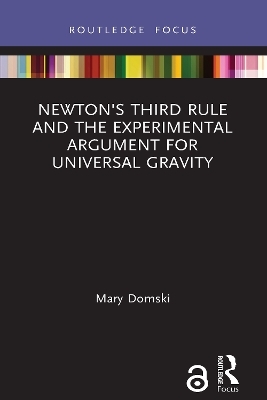
Newton's Third Rule and the Experimental Argument for Universal Gravity
Seiten
2021
Routledge (Verlag)
978-1-032-02036-5 (ISBN)
Routledge (Verlag)
978-1-032-02036-5 (ISBN)
This book provides a reading of Newton’s argument for universal gravity that is focused on the “experimental” reasoning that Newton associates with his program of experimental philosophy. It highlights the complexity of the Principia and also draws important lessons about how to situate Newton in his natural philosophical context.
This book provides a reading of Newton’s argument for universal gravity that is focused on the evidence-based, "experimental" reasoning that Newton associates with his program of experimental philosophy. It highlights the richness and complexity of the Principia and also draws important lessons about how to situate Newton in his natural philosophical context.
The book has two primary objectives. First, it defends a novel interpretation of the third of Newton’s four Rules for the Study of Natural Philosophy – what the author terms the Two-Set Reading of Rule 3. Second, it argues that this novel interpretation of Rule 3 sheds additional light on the differences between Newton’s experimental philosophy and Descartes’s "hypothetical philosophy," and that it also illuminates how the practice of experimental philosophy allowed Newton to make a universal force of gravity the centerpiece of his explanation of the system of the world.
Newton’s Third Rule and the Experimental Argument for Universal Gravity will be of interest to researchers and advanced students working on Newton’s natural philosophy, early modern philosophy, and the history of science.
This book provides a reading of Newton’s argument for universal gravity that is focused on the evidence-based, "experimental" reasoning that Newton associates with his program of experimental philosophy. It highlights the richness and complexity of the Principia and also draws important lessons about how to situate Newton in his natural philosophical context.
The book has two primary objectives. First, it defends a novel interpretation of the third of Newton’s four Rules for the Study of Natural Philosophy – what the author terms the Two-Set Reading of Rule 3. Second, it argues that this novel interpretation of Rule 3 sheds additional light on the differences between Newton’s experimental philosophy and Descartes’s "hypothetical philosophy," and that it also illuminates how the practice of experimental philosophy allowed Newton to make a universal force of gravity the centerpiece of his explanation of the system of the world.
Newton’s Third Rule and the Experimental Argument for Universal Gravity will be of interest to researchers and advanced students working on Newton’s natural philosophy, early modern philosophy, and the history of science.
Mary Domski is Professor of Philosophy at the University of New Mexico. Her research focuses on the philosophy, mathematics, and science of the early modern period. She has authored numerous papers on Newton and Descartes and edited the special issue "Newton and Newtonianism" for The Southern Journal of Philosophy (2012).
Chapter 1: Introduction
Chapter 2: The Rules in the Argument for Universal Gravity
Chapter 3: The Two-Set Reading of Rule 3
Chapter 4: Universal Qualities and Explaining the Phenomena
| Erscheinungsdatum | 06.07.2021 |
|---|---|
| Reihe/Serie | Routledge Focus on Philosophy |
| Verlagsort | London |
| Sprache | englisch |
| Maße | 138 x 216 mm |
| Gewicht | 258 g |
| Themenwelt | Geisteswissenschaften ► Geschichte |
| Geisteswissenschaften ► Philosophie ► Geschichte der Philosophie | |
| Geisteswissenschaften ► Philosophie ► Philosophie der Neuzeit | |
| Naturwissenschaften | |
| ISBN-10 | 1-032-02036-9 / 1032020369 |
| ISBN-13 | 978-1-032-02036-5 / 9781032020365 |
| Zustand | Neuware |
| Haben Sie eine Frage zum Produkt? |
Mehr entdecken
aus dem Bereich
aus dem Bereich
die kolonialen Wurzeln der französischen Theorie
Buch | Hardcover (2024)
Matthes & Seitz Berlin (Verlag)
28,00 €
oder Das Leben Montaignes in einer Frage und zwanzig Antworten
Buch | Softcover (2023)
C.H.Beck (Verlag)
18,00 €


